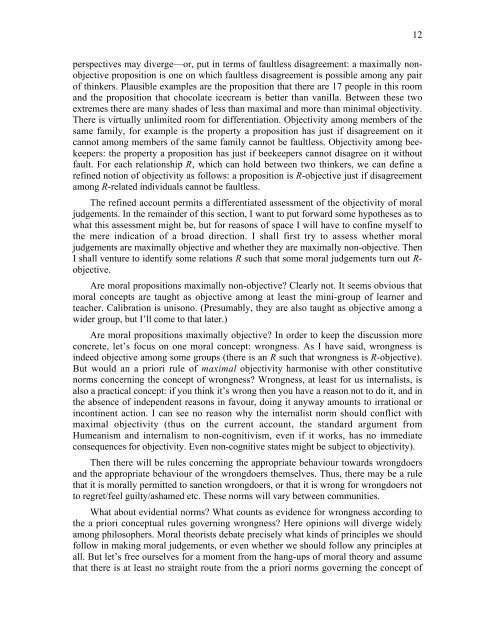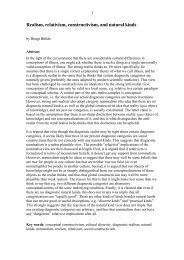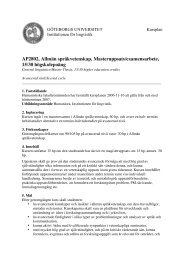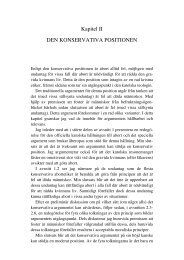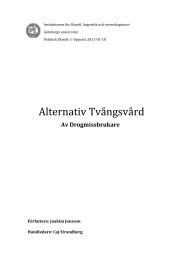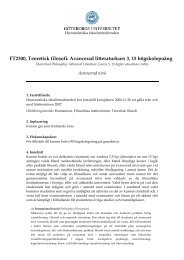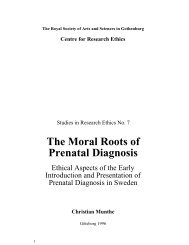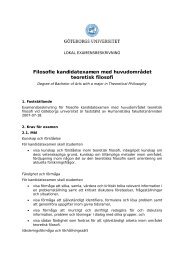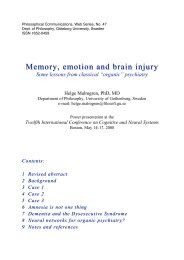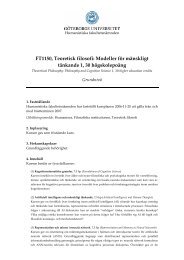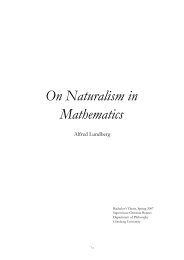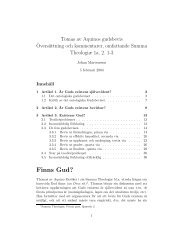Moral Relativism
Moral Relativism
Moral Relativism
- No tags were found...
Create successful ePaper yourself
Turn your PDF publications into a flip-book with our unique Google optimized e-Paper software.
12perspectives may diverge—or, put in terms of faultless disagreement: a maximally nonobjectiveproposition is one on which faultless disagreement is possible among any pairof thinkers. Plausible examples are the proposition that there are 17 people in this roomand the proposition that chocolate icecream is better than vanilla. Between these twoextremes there are many shades of less than maximal and more than minimal objectivity.There is virtually unlimited room for differentiation. Objectivity among members of thesame family, for example is the property a proposition has just if disagreement on itcannot among members of the same family cannot be faultless. Objectivity among beekeepers:the property a proposition has just if beekeepers cannot disagree on it withoutfault. For each relationship R, which can hold between two thinkers, we can define arefined notion of objectivity as follows: a proposition is R-objective just if disagreementamong R-related individuals cannot be faultless.The refined account permits a differentiated assessment of the objectivity of moraljudgements. In the remainder of this section, I want to put forward some hypotheses as towhat this assessment might be, but for reasons of space I will have to confine myself tothe mere indication of a broad direction. I shall first try to assess whether moraljudgements are maximally objective and whether they are maximally non-objective. ThenI shall venture to identify some relations R such that some moral judgements turn out R-objective.Are moral propositions maximally non-objective? Clearly not. It seems obvious thatmoral concepts are taught as objective among at least the mini-group of learner andteacher. Calibration is unisono. (Presumably, they are also taught as objective among awider group, but I’ll come to that later.)Are moral propositions maximally objective? In order to keep the discussion moreconcrete, let’s focus on one moral concept: wrongness. As I have said, wrongness isindeed objective among some groups (there is an R such that wrongness is R-objective).But would an a priori rule of maximal objectivity harmonise with other constitutivenorms concerning the concept of wrongness? Wrongness, at least for us internalists, isalso a practical concept: if you think it’s wrong then you have a reason not to do it, and inthe absence of independent reasons in favour, doing it anyway amounts to irrational orincontinent action. I can see no reason why the internalist norm should conflict withmaximal objectivity (thus on the current account, the standard argument fromHumeanism and internalism to non-cognitivism, even if it works, has no immediateconsequences for objectivity. Even non-cognitive states might be subject to objectivity).Then there will be rules concerning the appropriate behaviour towards wrongdoersand the appropriate behaviour of the wrongdoers themselves. Thus, there may be a rulethat it is morally permitted to sanction wrongdoers, or that it is wrong for wrongdoers notto regret/feel guilty/ashamed etc. These norms will vary between communities.What about evidential norms? What counts as evidence for wrongness according tothe a priori conceptual rules governing wrongness? Here opinions will diverge widelyamong philosophers. <strong>Moral</strong> theorists debate precisely what kinds of principles we shouldfollow in making moral judgements, or even whether we should follow any principles atall. But let’s free ourselves for a moment from the hang-ups of moral theory and assumethat there is at least no straight route from the a priori norms governing the concept of


